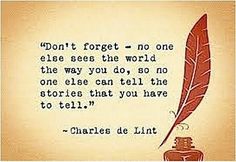On our first full day of sixth grade, I hand each of my students a reading and writing survey and ask them to tell me a little bit about themselves as readers and writers. Their answers, as they slowly filter in over the course of the week, allow me valuable insights. I learn about how my students choose books, view themselves as readers and writers, and struggle with this or that aspect of reading and writing. I learn about their proudest writing experience, and how they hope to grow as readers and writers. And, I learn about the mechanics of their writing: where they stand with grammar conventions, spelling, even their handwriting issues. By the end of that first week, I usually have a pretty good idea as to where our journey in 6th. grade writing workshop needs to begin.
This year’s writing surveys revealed three things:
- many of my kids “really, really don’t like to write”
- many of my kids said that they “never know what to write about”
- and most of my kids said that even when they started out writing about something good, they “got stuck – and the story kinda stank”
My in-class experience of these sixth graders, however, told me a different story. They seemed to have plenty to say, and they seemed to know how to tell a great story (funny points to make us laugh, thoughtful comments to make us pause, great descriptions so we could visualize). But they didn’t seem to see any connection between these natural as-we-are-settling-into-the-day stories and the ones they wanted to write in their writer’s notebooks. They did not see themselves as writers.
So, much of our time this past week and a half has been spent engaged in these activities:
We created visual tools to jog our writing memories, beginning with heart maps which my sixth graders are familiar with:
then created a few more sketches – idea banks for more stories to remember, share, and write about:


and we finished up our week with an idea borrowed from Ralph Fletcher’s memoir, Marshfield Dreams: When I was a Boy:
We tried to get specific with our jottings, and I used my own map to demonstrate how we could do this – “my climbing tree” for instance needed specific stories to serve as a more meaningful jog to my memory. Students went back to their visual tools to do the same, creating better idea banks for later writing endeavors.

We gathered in our meeting area to story tell, trying to generate at least 3 to 5 minutes of an oral narrative based on one of our jottings. Classmates would ask questions at the end, trying to draw out further details which we’d make sure to note down – perhaps these notes would help us when we were stuck in the writing process later on.
We experimented with brainstorming sketches, to see if we could flesh out writing ideas and think through how we’d envision a narrative from beginning to end – what events would we include? what details would make the piece more interesting?

By the end of the week, I felt that my students felt much more comfortable about returning to writing workshop ready to write. We have ideas, we’ve practiced storytelling, we’ve thought about details we’d want to include in our narratives…we are ready to put the writing back in writing workshop.






Thank you for another great post! Though I teach younger students, I always manage to glean choice ideas here. Many thanks!
LikeLike
As always, I appreciate your posts Tara! I am wondering if you use a particular writing survey… I haven’t found one that I love.
LikeLike
Hi Diana – yes, I do. I’ll share it with you via Google docs when I get a chance!
LikeLike
Several years ago I began the practice of beginning writing workshop with oral storytelling with my kindergartners. It has turned out to be one of my best decisions, leading to richer written stories with so much more detail and voice.
LikeLike
Love this, Tara! I love how you slowed down and took so much time telling and sharing stories! This will pay off in large dividends later, I’m sure!
LikeLike
This is just what I needed for the week! I love all these strategies, collected in one place. I could imagine a chart somewhere in the classroom listing these strategies as choices for what to do when you’re stuck. Thank you!
LikeLike
That’s a great idea – thanks!
LikeLike
Tara,
It’s always so interesting to see what the students say. Building on LInda’s thoughts above, are the students “waiting to be told WHAT to write about at school”? Have past writings been based on teacher-directed topics? So great that you spent the time valuing their ideas and building their own collections so they know they can and do have writing in their lives that will matter to them!
The students will be amazed by their own changes in attitudes, etc. as the year progresses! ❤
LikeLike
I hope this will be a great springboard for what’s next Tara. Interesting that their lively conversations and story-telling doesn’t connect with “writing in school”. Maybe being too specific in the assignments holds them back? Or, they write just to be done? Your work this past week was rich in content, so hope this will be the fuel to ignite! Have a great week!
LikeLike
Thanks Tara,
This was the perfect post to share with a couple of my colleagues this week!
LikeLike